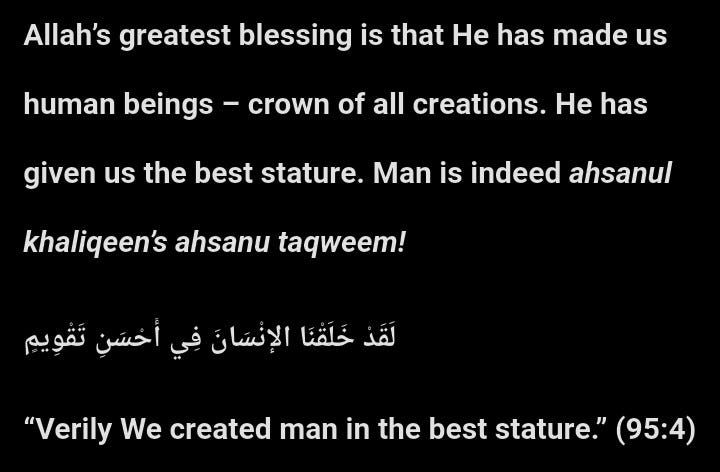Understanding the Divine Design: The Perfection of Human Creation
Written on
Chapter 1: The Concept of Ahsan Al Taqweem
The Quran asserts that humans were fashioned in the most remarkable manner (ahsan altaqwim) (95:4), endowed with the intellect to recognize and understand God. The teachings of Islam aim to reconnect individuals with their inherent nature.
The notion of Ahsan-al-Taqweem (the finest stature as the ultimate model of creation) is encapsulated in the following verse: "We have created humanity in ahsan-i taqwim [the finest form], characterized by stature, beauty, and optimal bodily function, harmonizing the properties of the universe." (Sûrat-ut-Tîn:4, Bawdâwî).
The Lord of all creation declares, "Indeed, We have fashioned humans in the best form as the perfect representation of creation" (At-Tin Surah, 95:4). This ideal form embodies the potential for comprehension, belief, action, love, compassion, and joy.
The emergence of prophethood is rooted in this exalted quality, with saints and learned scholars being its fruits. Those who are knowledgeable, spiritually aware, and just rulers exemplify various aspects of this divine attribute.
While Ahsan-al-Taqweem is often interpreted as external beauty, it primarily refers to the human soul. The body is merely a temporary abode for the soul, with the guest's honor reflecting upon the dwelling itself. Thus, Ahsan-al-Taqweem signifies the superiority of human qualities over mere physical attributes.
Bediuzzaman, in his work The Risale-i Nur, states that disbelief erodes human virtues, degrading them from precious diamonds to coal, illustrating a profound truth — humanity is inherently created with the quality of a diamond, termed ahsen-u taqweem. When one strays from divine guidance, they may descend to a lower state, symbolized as coal.
Interestingly, both diamonds and coal share the same basic components. This highlights how contrasting qualities can emerge from identical origins, akin to forming different words from the same letters.

Chapter 2: Imam Qurtubi's Perspective on Ahsan-i Taqweem
According to Imam Qurtubi in his Tafsir, everything that Allah (swt) has created in the larger universe has a corresponding representation within humanity, who is viewed as a microcosm. This concept is illuminated by the following Qur’anic verse:
"For those who reflect on the signs of Allah’s power in the world [in nature and within themselves], there are many indications of His existence. Do you not observe them?" (Sûrat-udh-Dhâriyât:20, 21).
Human sensory organs can be likened to celestial bodies; ears and eyes function as the sun and moon in perceiving the world around us. Upon the decomposition of our bodies, we return to the earth.
Blood and moisture symbolize water, while the soul and breath represent air. Bile signifies fire, and blood vessels resemble rivers, all nourished by the liver, akin to a spring. The interconnectedness of blood vessels is reminiscent of rivers flowing into the sea.
Bones can be compared to mountains, which serve as the earth's foundations, while limbs are analogous to trees, each fulfilling a unique function. The hair on our bodies resembles grass on the earth. Humans possess the capacity to imitate the sounds of various creatures.
Thus, it becomes evident that the essence of everything in this vast universe is mirrored in humanity, the microcosm. This reinforces the notion that humans have been fashioned in the finest form.
Exploring the Creation's Perfection: What Does it Mean that the Creation Was "Very Good"?
This video delves into the significance of the creation being termed "very good" in a theological context, highlighting the implications for our understanding of humanity's role in the universe.
The Creation of Man: The 6th Day of Creation - Genesis 1:24-31
This video offers insights into the biblical account of the creation of man on the sixth day, discussing the theological and philosophical dimensions of this pivotal moment in creation.
JazakAllah (May Allah reward you with goodness) for engaging with this content. Please follow and subscribe for more enlightening stories delivered to your inbox.